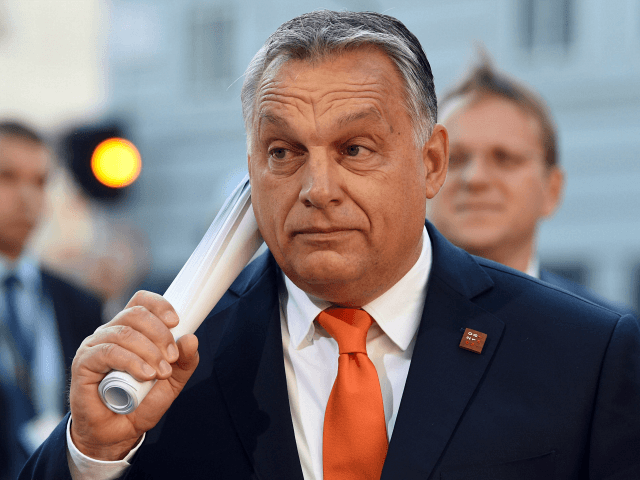Hungarian leader Viktor Orbán has praised Donald Trump’s anti-globalist UN address, criticised Hillary Clinton’s actions as Secretary of State, and slammed EU Commissioner Dimitris Avramopoulos for propagandising for mass migration.
In an interview transcript seen by Breitbart London, the conservative-populist prime minister told Kossuth Radio that he could not begin to say how much his country “suffered during the term in office of Secretary of State [Hillary] Clinton”.
Orbán said that after the election of President Trump, “massive weights were lifted from the shoulders of leaders and citizens in many countries” burdened by “unwarranted attempts” to bend their will to that of the D.C. establishment, and that the path was now open to “establish a partnership on the basis of [national] interests”.
“President Trump is becoming something more than an individual person… in the world, his presence is more like that of an icon: a manifestation that represents something much more than his person alone does,” Orbán added, highlighting the extent to which the American maverick has shaken up the established world order.
Prime Minister Orbán contrasted President Trump’s address to the United Nations, in which he declared “We reject the ideology of globalism, and we embrace the doctrine of patriotism”, with that of the European Union’s Commissioner for Migration, Dimitris Avrampoulous, which emphasised the supposedly urgent need for more migration and more multilateralism, rather than stronger borders and national sovereignty.
“At the end of the day, this fine fellow, who is a [European] Commissioner, is our employee, he is paid by us… his job is to represent us. If, however, he is unable to represent every member-state, he should refrain from voicing opinions in the name of the EU, because this raises a major problem for democracy,” Orbán warned.
“This fine fellow went there and said that migration is good, migration must continue, a migrant resettlement programme must be implemented, [and] the EU unreservedly wants to take part in the UN’s Migration Compact, which supports the relocation of people from one part of the world to another… He has received no authorisation from anyone to say any of this,” he added.
“This is a matter of dispute in the European Union today: this is opposed not only by the Hungarians, not only by most Central Europeans, and not only by the V4; but it is also opposed by the Italians, and indeed by the Austrians and the Bavarians… It is therefore no wonder that there are many of us on this continent who look forward to the European Parliament elections next May, so that we can finally send people like him packing,” the Hungarian leader concluded bluntly.
Prime Minister Orbán also touched upon the question of mass migration and demographics more broadly, having indicated that the latter will be the first priority of his administration after its recent super-majority election victory.
“When all is said and done, we’re talking about children, and about how young people plan their future,” he opined.
“In the European Union they simply solve this problem by saying that demography is a science of numbers, and that there is a shortage of people: ‘Let’s replace them with people from elsewhere: we’ll replace a European with an African; if we are short of a European, a Swede, a German or an Austrian, let’s bring in someone from Asia to replace them – because what matters is that the numbers add up.’ On this the Hungarian people think differently,” he suggested, in remarks sure to draw the ire of the polite opinion in Western Europe.
“The Hungarian people are a community with a strong national identity, community awareness, and strong family feelings. For us demography or population growth is not a matter of numbers. What we can say is that we do not want numbers: we want Hungarians… Surveys appear to show that [young people] do want children, but in the everyday helter skelter of life they come up against obstacles which make them compromise on their earlier plans, and finally decide to have fewer children than they originally wanted – so fewer children are being born,” he suggested.
“I envisage a Hungary where not a single young person has to change their family plans just because they encounter economic, financial difficulties.”

COMMENTS
Please let us know if you're having issues with commenting.